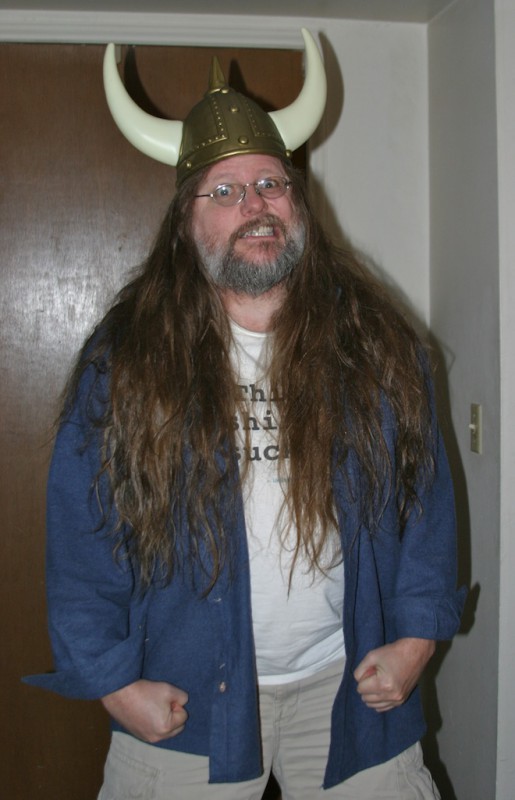Back when printing was young, fantasy stories were all the rage. They went by the name Chivalry Tales back then, and followed a well-defined formula involving stout hearts, unrequited love, and great feats of heroism against mythical beasts and evil sorcerers. Good fun.
Sometimes following a formula can be a good thing, allowing a reader and a writer to get down to business with little wasted verbiage. Interesting characters can make the formula worthwhile, and even in suspense novels there’s really not much question who’s going to win in the end. It’s about providing an enjoyable journey. There just aren’t that many plots in the world, when all is said and done; you can argue that every story follows one of a limited set of formulas.
On the other extreme, there’s “literary fiction”, the genre defined by the resolute insistence that it’s not a genre, the more extreme practitioners of which often take avoidance of formula so far that they also avoid having any plot at all. Whee.
But, even if formula isn’t necessarily bad, ‘formulaic’ is. If a story is just another rehash of the same old shit with no new twist or compelling characters, it’s not fun, and just confirms to the literati their snooty contention that all formula is bad. Jerks.
What do you do if you’re surrounded by mediocre fantasy novels? If you’re someone like me, you make an online scoreboard and fiddle with a parody called The Quest for the Important Thing to Defeat the Evil Guy. If you’re Miguel de Cervantes, you write Don Quixote . (Yes, I just said Quest and Quixote are siblings. You got a problem with that?) In Don Quixote, there is a scene in which a few of the more rational characters burn copies of many popular titles of the day, with commentary. A few they preserve. Let there be no doubt that this novel intends to disparage the knock-offs. The dude names names.
. (Yes, I just said Quest and Quixote are siblings. You got a problem with that?) In Don Quixote, there is a scene in which a few of the more rational characters burn copies of many popular titles of the day, with commentary. A few they preserve. Let there be no doubt that this novel intends to disparage the knock-offs. The dude names names.
As a thought experiment, I repeated the book-burning scene in my head, substituting some of the bigger titles from the modern fantasy library. It was pretty fun. A few titles survive, by virtue of history or quality, while many are mocked and burned.
When I first loaded Quixote onto my readin’ machine and opened the virtual cover, I saw how big the sucker is. Holy crap, 1500 pages! It’s in two parts, separated in publication by several years. Interesting story — Cervantes kept talking about writing a sequel but he was too busy trying to transform theatre (without success). Then someone else published a sequel to his story and that lit a fire under his ass.
How do I know this? Because the very long book is prefaced by a very long introduction by the translator. He discusses other translations, their strengths and (mostly) shortcomings, and that was pretty interesting. He mapped the change in the perception of the story over time. He also argued that the story’s just plain funnier in its original language, as Cervantes has a terse, laconic wit that Spanish expresses particularly well. (While a chicken-and-egg argument might be fun here — does the language shape his humor or the other way around — the point remains, his jokes are tuned to the Spanish ear.)
When looking for an edition to link to here, I chuckled when I noticed that Amazon sold a “Spanish Edition” of the novel.
As fun as that part of the introduction was, things got really interesting when we came to the biography of the author. Cervantes was one remarkable dude, in a way I’ve been completely unable to capture in one or two sentences. He wasn’t put to death even after his third attempt to escape from an Algerian prison. I’ll leave it at that.
So, the story. It’s big, as I mentioned before. We meet an aging man of modest means, who has come to believe all the chivalry stories he has read as literal truth. The stories are, in fact, more true for him than anything else, and all his perceptions are filtered through the conventions of the fantasy story. The famous windmill incident happens early on, and is fairly minor, in the scheme of things, though it doesn’t go well for the good Don Quixote.
In fact, nothing goes well for him. His campaign to right the wrongs of the world is a series of disasters. Some of the mishaps are funny, some are merely sad. Other people suffer as a result of his delusions. Then there’s faithful Sancho Panza, his squire. Sancho, filled with dreams of inheriting an island kingdom following the inevitable triumph of his master (that’s how these things work, after all), follows Don Quixote (sometimes reluctantly) and receives his own share of abuse. As the story progresses and Cervantes gains more confidence in Sancho’s voice, his comments become both subtle and cutting, while maintaing his aura of simple servitude. It’s the sidekick that makes this story an enduring tale.
How many times do you have to be kicked in the face before you give up your quest? Don Quixote’s saving grace is that he will not, he cannot, give up. I suspect that many of the mythical heroes he compares himself to would have long since packed it in and gone home, faced with the downturns Quixote has faced. But on he goes, because hardship merely proves the worthiness of the cause. It’s not supposed to be easy. If he weren’t a nut job, he’d be pretty easy to admire.
Coincidence is a mover in this story. In the end, everyone who matters winds up at the same inn, and hijinks ensue. Blake Edwards made a living off this sort of stuff a few centuries later. Thinking about it, I’d be interested in seeing what someone like Edwards did with the story. (This translator did mention that Don Quixote suffered for centuries perceived as merely a bawdy farce. It seems now I’m proposing returning it to that low regard. But it would be fun.)
There are sonnets in this book. Lots of them. At first I didn’t know what to make of all the friggin sonnets. Then I realized that they’re part of the parody. The old chivalry tales are silly with sonnets. But… these are almost good, to my ear. It’s with the sonnets I felt the gulf of language and time most profoundly. Are they hilarious? Merely awkward? Over the top? Filled with contemporary references? Makes me want a time machine and a babel fish.
I wonder about the translation on a couple of fronts. Translating a work of literature from one language into another is difficult enough, but this translation has to cross centuries as well. In this version, uneducated commoners speak in what today comes off as really upper-crust language, and it’s ponderous and hard work to read. “Thee” and “Thou” abound. Regular folk in this story don’t talk like regular folk do here, now.
I contend that if Cervantes wrote his story today, in English, the word “fuckin'” would be in it. While adding a word like that would be an extreme liberty on the part of a translator, I don’t think it’s going too far to make regular guys back then speak like regular guys today. It would be a conscious decision by the translator to move the story across time as well as borders, but I think the result would more closely mirror the experience readers had back then. There’s an extended poop joke, for crying out loud, and the word ‘shit’ does not appear in this translation. I didn’t bother searching on ‘turd’. I might have used ‘steamer’, were it up to me to translate. The aromatic qualities come into play.
I’m done with part one, a bit less than halfway through the monster. The opening notes indicate that the translator at least thought part two was where Sancho really got going and that it is the better half of the opus. I’m… not eager to continue at this time. I will read the rest someday, I have no doubt. But not yet.
Note: if you use the above link to buy this book (or a Kindle , or a new car), I get a kickback. You should also know that if you have an electronic reading device, you can download this sucker for free. I chose to link to an edition with illustrations; I don’t know if it’s the same translator.
, or a new car), I get a kickback. You should also know that if you have an electronic reading device, you can download this sucker for free. I chose to link to an edition with illustrations; I don’t know if it’s the same translator.
Sharing improves humanity:





